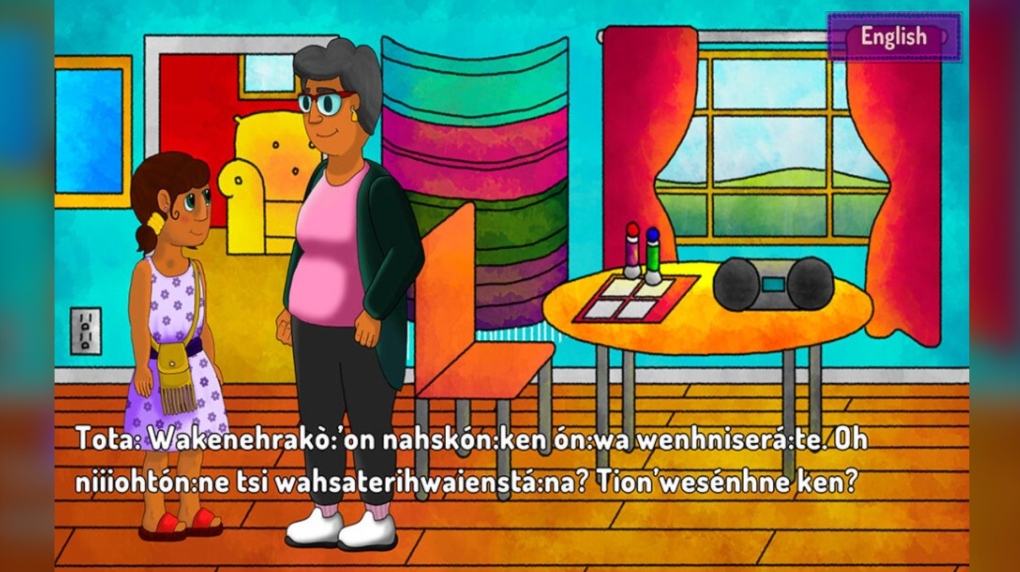Indigenous sisters developing video games to revitalize Mohawk language
Two Kanienʼkehá:ka (Mohawk) sisters from Montreal are on a mission that is close to their hearts: to save the language of their ancestors.
Kahentawaks and Wennekerakon Tiewishaw are from Kanesatake, about 40 minutes northwest of Montreal.
They learned to speak Kanienʼkéha (Mohawk language) in elementary school, but with few chances to practice, they ended up losing it.
"Our mother and father don't speak at all, but our grandmother and grandfather spoke fluently, but they didn't pass it on to their kids," said Wennekerakon.
The sisters hope to revitalize the language through Indigenous video games called Revital Software. A demo of the game Karihonniennihtshera is available online.
Their goal: to make learning fun and engaging for everyone young and old.
The games are based on well-known Haudenosaunee (Iroquois) legends, stories steeped in tradition they heard growing up.
"There is something about Indigenous languages that will teach you how to think of yourself in relation to nature and in relation to other people in a more respectful way," said Kahentawaks. "Today, the Mohawk language has fewer than 4,000 speakers worldwide: most of them are elderly."
Kahentawaks said she has lost sleep over the thought of her language being lost, which spurred on the desire to work on the games.
 Karihonniennihtshera by Revital Software"It's a great motivator to continue to motivate us to work on these projects because we want to be able to help the teachers in our communities," said Wennekerakon. "Hopefully, it will remind ourselves a lot more about how to speak and how the right intonation and communicate with each other eventually."
Karihonniennihtshera by Revital Software"It's a great motivator to continue to motivate us to work on these projects because we want to be able to help the teachers in our communities," said Wennekerakon. "Hopefully, it will remind ourselves a lot more about how to speak and how the right intonation and communicate with each other eventually."
Once these games are off the ground, the sisters want to expand to other Indigenous languages, as they fight to keep a crucial part of their identity alive.
CTVNews.ca Top Stories

How quietly promised law changes in the 2024 federal budget could impact your day-to-day life
The 2024 federal budget released last week includes numerous big spending promises that have garnered headlines. But, tucked into the 416-page document are also series of smaller items, such as promising to amend the law regarding infant formula and to force banks to label government rebates, that you may have missed.
Which foods have the most plastics? You may be surprised
'How much plastic will you have for dinner, sir? And you, ma'am?' While that may seem like a line from a satirical skit on Saturday Night Live, research is showing it's much too close to reality.
opinion I've been a criminal attorney for decades. Here's what I think about the case against Trump
Joey Jackson, a criminal defence attorney and a legal analyst for CNN, outlines what he thinks about the criminal case against Donald Trump in the 'hush money trial.'
$3.8M home in B.C.'s Okanagan has steel shell for extra wildfire protection
A home in B.C.'s Okanagan that features a weathering steel shell designed to provide some protection against wildfires has been listed for sale at $3.8 million.
Diver pinned under water by an alligator figured he had choice. Lose his arm or lose his life
An alligator attacked a diver on April 15 as he surfaced from his dive, nearly out of air. His tank emptied with the gator's jaws crushing the arm he put up in defence.
Psychologist becomes first person in Peru to die by euthanasia after fighting in court for years
A Peruvian psychologist who suffered from an incurable disease that weakened her muscles and had her confined to her bed for several years, died by euthanasia, her lawyer said Monday, becoming the first person in the country to obtain the right to die with medical assistance.
Mystery surrounds giant custom Canucks jerseys worn by Lions Gate Bridge statues
The giant stone statues guarding the Lions Gate Bridge have been dressed in custom Vancouver Canucks jerseys as the NHL playoffs get underway.
Celebrity designer sentenced to 18 months in prison for smuggling crocodile handbags
A leading fashion designer whose accessories were used by celebrities from Britney Spears to the cast of the 'Sex and the City' TV series was sentenced Monday to 18 months in prison after pleading guilty in Miami federal court on charges of smuggling crocodile handbags from her native Colombia.
Wildfire leads to evacuation order issued for northeast Alberta community
An evacuation order was issued on Monday afternoon for homes in the area of Cold Lake First Nation.
































